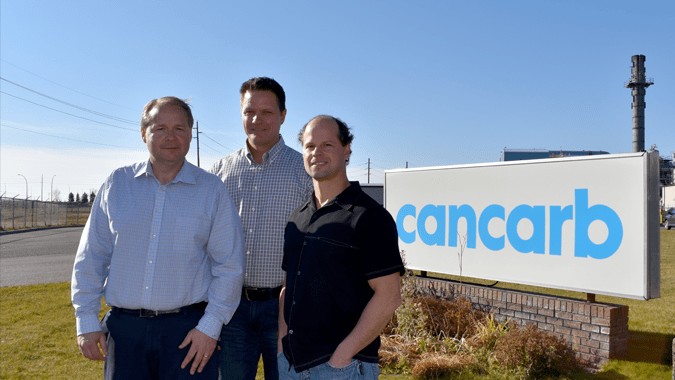The Cancarb-College Connection

For many Cancarb employees, their place of employment isn’t the only thing they have in common. At least 30 of the 80 people working at the local manufacturing plant have studied in a variety of programs at Medicine Hat College (MHC) over the years, including power engineering, university transfer science, business administration, information technology, and welding.
Having the opportunity to start his education at home made MHC the first choice for Ross Buchholz, Cancarb’s vice-president of product quality and development. He studied university transfer science at the college in the mid-1980s before moving to the University of Alberta where he completed a biology degree with a minor in chemistry.
One of his most memorable experiences at the college happened during the second week of school. After skipping a chemistry class, he saw his instructor in the hallway later that day.
“He looked at me and said, ‘how come you weren’t in class?’ In a class of 100 first year students, I don’t know how he knew I wasn’t there but that moment kept me accountable. I realized that if he was watching me, I better show up,” recalls Buchholz.
“MHC has a personal side to it. If I had done that in university no one would have cared, but at the college it was different. I don’t know where I would have ended up if I hadn’t attended MHC. It opened a door for me.”
Buchholz started in Cancarb’s lab right out of university and learned the production and operations side of the business before moving into a marketing role. The company is a leading producer of thermal carbon black, a derivative of natural gas found in everyday products like plastics, rubber and concrete. His career has taken him to 38 countries around the world and provided opportunities to build relationships and have cultural experiences that he never thought possible during his college days.
Cancarb’s plant manager, Bob Nichols, and chief steam engineer, Jeff Maier, also launched successful careers in power engineering after graduating from MHC. Both were recruited by TransAlta right out of school and spoke highly of the program’s reputation in industry.
“I learned about work ethic at MHC. It wasn’t an easy course and the expectations were very high. After doing that for two years it carried on naturally into my career. The instructors were very good and when we got out of the program we knew our stuff,” says Nichols.
With their careers well established, all three alumni continue to be involved with Medicine Hat College by providing opportunities and support for a new generation of learners.
Current power engineering students are able to gain valuable hands-on experience through practicum and summer placements at Cancarb. As an alumnus and industry representative, Maier sits on the college’s power engineering advisory board and provides feedback on student performance and recommendations for program growth.
Making education accessible is also important to the Cancarb team. The company recently pledged $15,000 to MHC in support of students enrolled in power engineering, business, and university transfer science. The company also offers separate scholarship funding for Cancarb employees and their children, many of whom have attended MHC.
“It’s our neighbours and our kids that are going to the college. These scholarships might be just enough to get them through that first or second year of school and push them along to have that higher education opportunity,” says Buchholz.
The importance of community at Cancarb is evident, whether they’re giving back to students or sharing the bond of their MHC education.
“That alumni connection can provide a head start on building trust and relationships. There’s common ground and shared experiences at the outset,” explains Maier.
It has a small town feel, adds Nichols.
“We call it the Cancarb family.”
Want to share your college connection? Contact MHC's alumni office at alumni@mhc.ab.ca.
